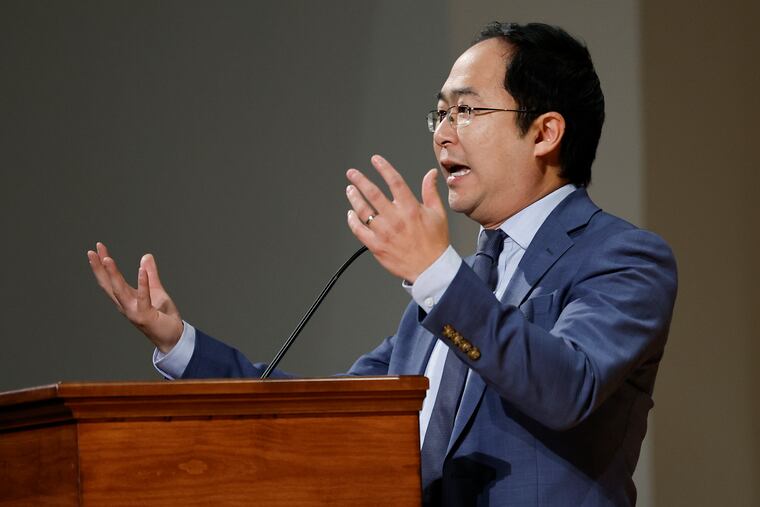What you need to know about the federal court ruling against ‘the county line’ in N.J. elections
Andy Kim filed suit against the “county line.” Here’s why his court win could reshape New Jersey politics.

U.S. District Judge Zahid Quraishi on Friday issued a ruling that has sent shock waves through New Jersey politics, siding with critics of the system by which the state determines where candidates appear on electoral ballots — known as “the county line” — and ordering a redesign before the June 4 primary.
The lawsuit was filed by U.S. Rep. Andy Kim, who is running in the Democratic primary for the U.S. Senate seat currently held by U.S. Sen. Bob Menendez, as well as two other Democratic congressional candidates.
» READ MORE: New Jersey must redesign its ballots after judge grants Andy Kim’s challenge to party bosses
So what is “the county line” and why is it so important? Here’s what you need to know.
What is ‘the line?’
In New Jersey, each county designs its own ballots, and county clerks use that power to give preferential positioning to primary candidates favored by the local Democratic and Republican Parties.
Candidates who get the more prominent placement on the ballot are said to have “won the line.”
The other candidates are relegated to what insiders describe as “ballot Siberia.” Sometimes candidates drop out once they learn they have not won the line, an indication of the futility of fighting local political machines in the Garden State.
All but two of the state’s 21 counties use some form of “line,” said GOP consultant Chris Russell. The two that don’t are Salem County in South Jersey and Sussex County in North Jersey.
Why did Andy Kim sue?
Kim won the line while running for his U.S. House seat. But it didn’t look like he was poised to benefit from the practice at the beginning of this year’s high-profile race to determine who will replace scandal-plagued Menendez, who is forgoing the primary but still weighing an independent run.
Kim’s chief rival in the primary was New Jersey first lady Tammy Murphy, who had won the party endorsement in many of the counties with significant numbers of Democratic voters that use the line. Kim made challenging the line a central part of his campaign, calling it a tool of New Jersey’s “broken” machine politics and filed suit to overturn the system in February.
But the court case may not end up making much of a difference for Kim’s chances of winning the race. Murphy unexpectedly dropped out of the race just days before the ruling. Ironically, 17 of the 19 counties that had sided with Murphy had since decided to put Kim on the line.
What did Quraishi rule?
In his 49-page decision, Quraishi granted Kim’s request for a preliminary injunction, saying the old system undermined the “integrity of the democratic process for a primary election.”
The judge ordered New Jersey’s county clerks to redesign June’s primary ballots to put all candidates on a more equal footing by grouping them by the offices they are running for, rather than by whether they won party endorsements.
The clerks were also prohibited from conducting draws for ballot positions that “do not include a separate drawing for every office and candidate, and where every candidate running for the same office has an equal chance at the first ballot position.”
What impact will the ruling have?
John Carbone, an attorney who represented some of the clerks in court, said there is not enough time before the primary to make the changes: “With ballots required to be printed in one week and voting starting in 20 days, many county clerks have significant concerns about the feasibility of compliance with the court’s order.”
Over the weekend, an attorney representing 17 clerks wrote to the judge, asking for the order to be put on hold while they appeal. The Camden County Democratic Committee plans to join the clerks’ request. And the Morris County Republican Committee claimed that the ruling should apply to only Democratic candidates, not Republicans.
“[T]his Court’s Order could result in electoral chaos, however unintended, if not stayed pending appeal,” wrote lawyer Rajiv Parikh, who is representing the clerks.
Progressives and antiestablishment activists rejoiced over the decision, saying it will allow grassroots candidates to have a fair chance against party machines.
“We are grateful that Judge Quraishi looked at the antidemocratic results of an intentionally misleading primary ballot to decide that, at a time where democracy is being challenged worldwide, New Jersey will stand proudly for free and fair elections,” said Laura Zurlfluh, an activist with the progressive group Indivisible Cranbury.
But others cautioned it could have unpredictable consequences.
For instance, more conservative Republicans aligned with former President Donald J. Trump may find greater success in GOP primaries without the moderating influence that came from most county GOP organizations picking nominees with the help of the line.
And it’s also possible that the change could boost another class of potential candidates who may not have party backing but are not exactly scrappy grassroots underdogs: the wealthy and the well connected.
“Money becomes even more important potentially because now there’s nothing to level the playing field for someone who may not have money,” said William J. Caruso, a former staffer for several New Jersey Democrats and a public affairs consultant.
Another common prediction: There will be more candidates running for office overall.
The dominance of candidates backed by “the line” — especially incumbents — dissuades many from running for office in the first place. Without ballot favoritism, more people are likely to see paths to victory for themselves.